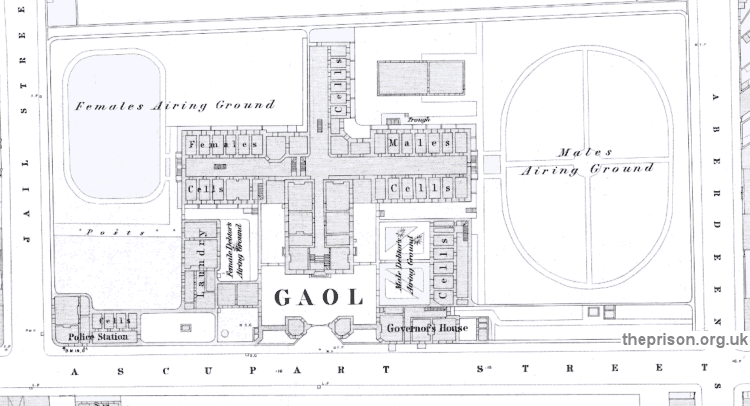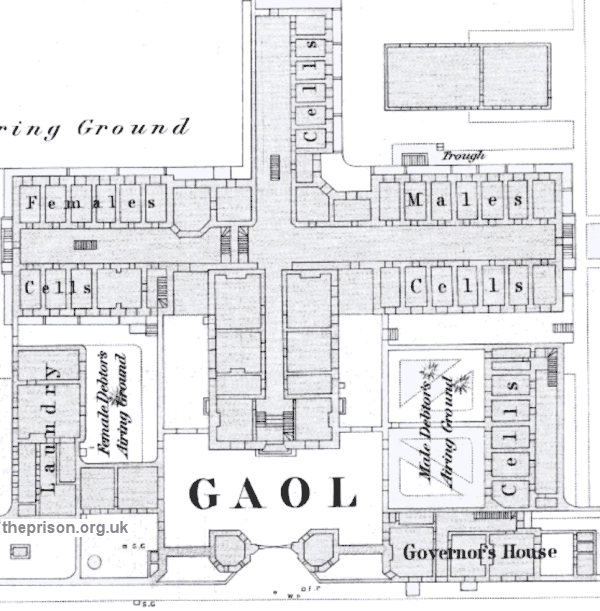Town Gaol and Bridewell, Southampton, Hampshire
The Southampton Town Gaol was in existence in 1855 and occupied a site at.
In 1855, five years after a condemnation of Southampton's gaol, bridewell and debtors' prison, which shared a building at God's House Gate, the establishment was relocated to new purpose-built premises at Ascupart (or Ascuparte) Street.
An 1859 directory described the prison as:
an extensive and substantial cruciform building in Ascuparte street, erected in 1854-5, at the cost of about £23,000, in lieu of the Old Gaol and Bridewell, which for several centuries occupied the towers, &c., at the South East Gate. It is built of red brick, with stone dressings, in the Tudor style, and the internal arrangements are on the plan of the Model Prison at Pentonville, so as to admit of a proper classification of prisoners, on what is called the separate system. The wards, galleries, and cells are well aired and ventilated, but the yards for out-door exercise are small, as the boundary walls enclose an area of less than two acres, being only about 150 yards long and 90 broad. The Governor's House is a good residence near the entrance gate; and the Chapel is a large and appropriately fitted up apartment. There are two small wards for debtors, and cells, &c., for about 112 prisoners.
The layout of the new prison is shown on the 1868 map below.

Ascupart Street prison site, Southampton, Hampshire, c.1868.

Ascupart Street prison site, Southampton, Hampshire, c.1868.
The main entrance on Ascupart Road had the prison governor's house to its east and a police station at its west. Males were housed at the east side of the prison and females at the west. Separated from the main cross-shaped cell block, debtors had their own accommodation, with the prison laundry on the women's side. A treadmill was located at the northeast corner.
In 1858, the Inspectors of Prisons reported:
This prison was first occupied on the 3rd of October 1855, and having been very well built, is in excellent repair. It contains accommodation for sixty-six male and thirty-five female prisoners, in certified cells. Twenty-one of tho cells for male prisoners being of smaller size than the remainder, have been certified on the condition that they shall only be occupied by prisoners for terms not exceeding three months. There are two reception-cells for prisoners of either sex, as well as three dark punishment cells for males and two for females. All these are well warmed and ventilated, but the reception cells being dark and damp, are seldom used except for a few hours at a time, and never at night. There is a very good and cheap machine for destroying vermin in prisoners' clothes by means of steam, which is much more effectual than the usual process of fumigation with sulphur. It was made by Mr. Haden of Trowbridge, at a cost of about 14l.
The prisoners present on the last day of inspection (17th April 1857) were the following:—
| Males. | Females. | Total. | |
| Convicted at assizes or sessions | 10 | 3 | 13 |
| Summarily convicted | 29 | 2 | 31 |
| Military and naval prisoners | 5 | - | 5 |
| Offenders against the Revenue laws | 7 | - | 7 |
| Debtors | 3 | 1 | 4 |
| Total | 54 | 6 | 60 |
There were no prisoner awaiting trial, the Sessions having recently terminated.
The prisoners, on being separately questioned, made no complaints.
The only labour is that of the treadmill, which is quite unproductive. When a tailor or shoemaker, or other tradesman, is in confinement, he is worked at his own trade for tho benefit of the prison; but there is no kind of labour provided, as required by law, for convicted prisoners not sentenced to hard labour, or for the untried. In a sea-port town there seems no reason why oakum picking, at least, should not be done.
The clothing and bedding were in good order, and the provisions for personal cleanliness appeared to be well carried out.
The articles of food were of good quality.
The Chaplain reads prayers daily, with a portion of Scripture which he expounds to the prisoners. He also visits prisoners in their cells, and distributes books to the prisoners once a week. He performs Divine Service twice on Sunday, and preaches one sermon. Ho takes frequent occasion to converse with prisoners in their cells.
There is no schoolmaster employed, which is a deficiency that ought to he supplied without delay, as there are always many young prisoners in confinement.
Adjoining to the treadmill is a shed containing, twenty divisions, in which it was intended to erect crank machines for labour; but as they had not been erected at the time of this my first visit to the prison, I strongly urged that that they should be countermanded, feeling convinced that the expense of erecting these worthless instruments of punishment would be universally regretted. The divisions would be very convenient for employing, the prisoners in picking oakum, or doing other kinds of labour in mild weather.
In the debtors' division the ventilation is very imperfect, as the smoke from the master-debtors' day-room descends into the cells of the County Court debtors below, There are four sleeping cells for Sheriff's debtors, and four for County Court debtor's, with a day-room for either class. The prison was extremely clean and orderly, and in every respect creditable to the management.
The prison was closed following the nationalisation of the prison system in August 1878. The site was then sold and used for a western extension of Wilton Street, now covered by the flats of Golden Grove.
Records
Note: many repositories impose a closure period of up to 100 years for records identifying individuals. Before travelling a long distance, always check that the records you want to consult will be available.
- Southampton Archives Service, Civic Centre, Southampton SO14 7LP. Only a few administrative documents survive.
- The National Archives, Kew, Richmond, Surrey, TW9 4DU. Has a wide variety of crime and prison records going back to the 1770s, including calendars of prisoners, prison registers and criminal registers.
- Find My Past has digitized many of the National Archives' prison records, including prisoner-of-war records, plus a variety of local records including Manchester, York and Plymouth. More information.
- Prison-related records on
Ancestry UK
include Prison Commission Records, 1770-1951
, and local records from London, Swansea, Gloucesterhire and West Yorkshire. More information.
- The Genealogist also has a number of National Archives' prison records. More information.
Bibliography
- Higginbotham, Peter The Prison Cookbook: A History of the English Prison and its Food (2010, The History Press)
- Brodie, A. Behind Bars - The Hidden Architecture of England's Prisons (2000, English Heritage)
- Brodie, A., Croom, J. & Davies, J.O. English Prisons: An Architectural History (2002, English Heritage)
- Harding, C., Hines, B., Ireland, R., Rawlings, P. Imprisonment in England and Wales (1985, Croom Helm)
- McConville, Sean A History of English Prison Administration: Volume I 1750-1877 (1981, Routledge & Kegan Paul)
- Morris, N. and Rothman, D.G. (eds.) The Oxfod History of the Prison (1997, OUP)
- Pugh R.B. Imprisonment in Medieval England (1968, CUP)
Links
- Prison Oracle - resources those involved in present-day UK prisons.
- GOV.UK - UK Government's information on sentencing, probation and support for families.
Except where indicated, this page () © Peter Higginbotham. Contents may not be reproduced without permission.



